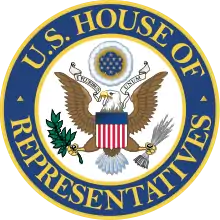George Hedford Dunn
George Hedford Dunn (November 15, 1794 – January 12, 1854) was a U.S. Representative from Indiana. He was born in New York City and moved to Lawrenceburg, Indiana in 1817 to study law. He was admitted to the bar in 1822 and commenced practice in Lawrenceburg, serving as member of the State house of representatives in 1828, 1832, and 1833. He was a promoter of the first railway in Indiana and was an unsuccessful candidate for election to the Twenty-fourth Congress.
George H. Dunn | |
|---|---|
| 4th Treasurer of Indiana | |
| In office February 9, 1841 – February 9, 1844 | |
| Governor | Samuel Bigger James Whitcomb |
| Preceded by | Nathan B. Palmer |
| Succeeded by | Royal Mayhew |
| Member of the U.S. House of Representatives from Indiana's 4th district | |
| In office March 4, 1837 – March 3, 1839 | |
| Preceded by | Amos Lane |
| Succeeded by | Thomas Smith |
| Member of the Indiana House of Representatives | |
| In office 1828 1832-1833 | |
| Personal details | |
| Born | November 15, 1794 New York City, New York |
| Died | January 12, 1854 (aged 59) Lawrenceburg, Indiana |
| Resting place | New Town Cemetery |
| Political party | Whig |
From March 4, 1837 to March 3, 1839, Dunn served on the Twenty-fifth Congress, but was an unsuccessful candidate for reelection. He resumed the practice of law and later became state treasurer from 1841-1844. He also served as judge of Dearborn County, Indiana and was president of the Cincinnati & Indianapolis Railroad at the time of his death in Lawrenceburg, Indiana on January 12, 1854. He was interred in New Town Cemetery.
References
- United States Congress. "George Hedford Dunn (id: D000547)". Biographical Directory of the United States Congress.
![]() This article incorporates public domain material from the Biographical Directory of the United States Congress website http://bioguide.congress.gov.
This article incorporates public domain material from the Biographical Directory of the United States Congress website http://bioguide.congress.gov.
| Political offices | ||
|---|---|---|
| Preceded by Nathan B. Palmer |
Treasurer of Indiana 1841–1844 |
Succeeded by Royal Mayhew |
| U.S. House of Representatives | ||
| Preceded by Amos Lane |
Member of the U.S. House of Representatives from Indiana's 4th congressional district 1837-1839 |
Succeeded by Thomas Smith |

